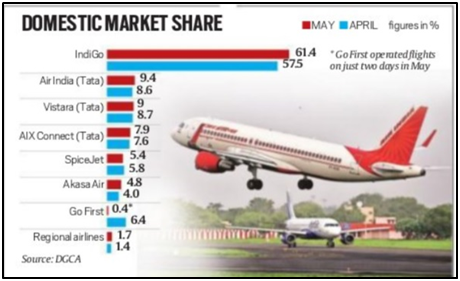Why in news?
- It appears that the domestic aviation market in India is now mainly controlled by two major players: IndiGo and the Tata group airlines (Air India, Vistara, and AIX Connect, which is Air Asia India).
- This situation is due to the fact that Go First is no longer operating and there is little chance of Jet Airways being revived.
- While it might be good news for IndiGo and the Tata airlines, a duopoly is certainly a cause of concern for consumers already contending with high airfares.
What’s in today’s article?
What is a duopoly and is it bad for consumers?
- About duopoly
- A duopoly exists when two players dominate the market for a product or a service.
- Generally, competition is seen as directly proportional to consumer interest, which means that higher the competition, the better it is for consumers.
- Going by that logic, a duopoly is theoretically not a very desirable proposition for consumers.
- Impact on consumers
- As per basic economic theory, higher competition usually results in lower prices, higher efficiencies, better products and services, and market expansion, among other things.
- In a duopoly, there is a strong likelihood of relatively higher prices and fewer choices for consumers, and suboptimal innovation and market growth.
- If allowed to consolidate and strengthen, duopolies can also act as huge impediments for new entrants, which again mean lower competition and choices for consumers on a sustained basis.
News Summary: The budding IndiGo-Tata airlines duopoly and what it could mean for consumers
Current Domestic market share
- SpiceJet is grappling with fleet-related and financial troubles of its own.
- Akasa Air do not appear to be in a position currently to mount a formidable challenge.
- IndiGo has emerged as the biggest beneficiary of the suspension of Go First’s operations, with the former’s domestic market share with respect to passengers carried jumping to 61.4 per cent in May from 57.5 per cent in April.
- The three Tata group carriers saw a cumulative market share rise of 1.4 percentage points over April to 26.3 per cent in May.
- Currently, IndiGo and Tata group airlines control a staggering 87.7 per cent of India’s domestic civil aviation market – the third-largest globally and growing rapidly.
- With an eye on future growth, both airline groups have lined up massive fleet expansion and modernisation plans.
- Recently, IndiGo ordered 500 Airbus jets – the biggest-ever aircraft order in the history of commercial aviation.
- The Air India group has also ordered 470 Airbus and Boeing aircraft.

Duopoly in India’s domestic aviation market – the concerns
- More pricing power in the hands of the dominant airlines
- India is a highly price-sensitive aviation market that has seen cut-throat competition between carriers over the past few years.
- A duopolistic structure puts more pricing power in the hands of the dominant airlines.
- Duopoly could also lead to a scenario in which the leading airlines just do not have enough incentive to compete enough on pricing and service quality.
- Limit unsustainable cut-throat competition
- From the aviation sector’s perspective, the duopoly might limit unsustainable cut-throat competition and predatory pricing at an overall level.
- Cartelisation among Indian carriers
- In future, the dominant players might be seduced into a mutually beneficial tacit understanding on airfare levels.
Domestic aviation sector
- Airfares are already heated up in India
- Suspension of Go First flights, combined with other factors like surging travel demand and capacity constraints, have forced flyers to pay through their noses.
- Total count of domestic flyers
- The total count of domestic flyers in May stood at a record high of 1.32 crore, up 15.2% year-on-year.
What lies in future for Indian aviation industry?
- Depends on how existing dominant players approach the market
- How IndiGo and the Tata airlines approach the market and the competition between them will play a critical role in shaping India’s civil aviation sector.
- An approach of intense competition to fight each other for more market share would augur well for consumers.
- How the less dominant players like Akasa Air and SpiceJet approach the market and competition from here will also be a crucial factor.
- Entry of new players
- Entry of another carrier backed by a solid conglomerate or deep-pocketed investors could also alter the contours of India’s aviation market.
- The example of Akasa Air is for all to see.
- In less than a year, the carrier has been able to expand its market share from nil to almost 5 per cent and is operating a fleet of 19 aircraft.
- Competition from other modes of transport
- A lot will also depend on competition from other modes of transport, like roads and railways, and to some extent, it could keep airfares from overheating too much.
- With fast-paced highway development and modernisation of railway infrastructure, short- and medium-haul air travel routes in particular could face some heat.
- Other factors
- Factors like affordability, duration, and comfort of travel would most certainly be the deciding factors.
- Government policies and regulations would certainly be critical
- Moves by the government that are bound to result in more competition in the domestic aviation market include:
- significantly lower entry barriers for new carriers,
- attract more investment in existing carriers and lead to creation of new ones,
- incentivise the sector’s growth, and
- make airfares more transparent.










